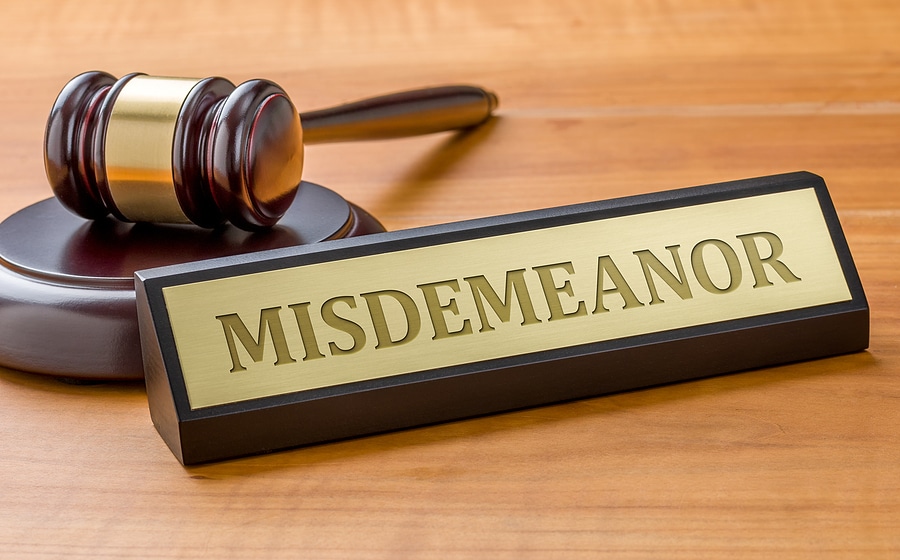Misdemeanors and felonies are different in many regards, and not just in the length of the jail sentence imposed if you are convicted of the crime. Either way, you will face significant consequences and upheaval, but the effects of a felony conviction will be far greater. Whether you are charged with or plead guilty to a felony or misdemeanor depends on the facts and circumstances of your case. Hiring an experienced criminal defense attorney for your case can make a difference in the outcome. Reach out to the criminal defense lawyers at Hogan Eickhoff to discuss your case today and learn more about your potential legal path forward.

While some people say that misdemeanors are less serious than felonies, there is no such thing as a “minor” criminal conviction. No matter what, you would face potential jail time and collateral consequences of the conviction. If you are facing any type of criminal charges, it is crucial that you immediately hire an experienced criminal defense attorney to protect your legal rights and advocate for you at every step of the way. In the meantime, here are some key differences between misdemeanors and felonies in Wisconsin.
Jail Sentences for Misdemeanors and Felonies
The main difference between a felony and a misdemeanor is in the length of punishment that you would receive for a conviction. Under Wisconsin law, misdemeanor crimes are punished by up to one year in prison. There is a cap on the punishment of misdemeanors. Felonies can be punished with up to life in prison. There are different classifications of felonies that allow for lengthy jail sentences to be imposed. Many felony crimes have mandatory minimum sentences and a requirement that you spend at least some time in prison (the entire jail sentence cannot be suspended).
The most major class of felony in Wisconsin can mean a sentence of life in prison. In total, there are nine different classifications of felonies in Wisconsin. Even the most minor class of felony can mean a jail sentence of up to 3 ½ years, so you are always facing drastic penalties.
Many Felony Crimes Require a Finding of Intent
Most felony crimes will require that the prosecutor prove that the defendant had some type of intent to commit the crime. In other words, the prosecutor would need to give a window into the defendant’s state of mind and show that they actually tried to commit the crime. It is impossible to commit many felonies by accident. Misdemeanors are often crimes that do not require any type of intent to be found guilty. However, there are a few exceptions. For example, DUI can be charged as a felony, even if the required state of mind is recklessness. Further, crimes like theft that require intent can be charged as misdemeanors, depending on the amount of money at issue. The crime can rise to a felony based on the value of the property that was allegedly taken.
Felony Convictions Can Mean the Loss of Certain Rights
All criminal convictions, regardless of whether they are a misdemeanor or felony, can mean that you are facing a number of adverse consequences. For example, if you are not a U.S. citizen and you have been convicted of a crime that involves moral turpitude, you can be deported from the country. There are certain additional consequences of a felony conviction.
For example, federal law requires that convicted felons surrender their firearms because they are not permitted to own them. In addition, convicted felons lose their right to vote until they have completed the terms of their punishment. Although Wisconsin law does not allow for employment discrimination against those who are convicted of crimes, there are still circumstances where felony convictions can make it harder for you to find employment.
Felonies Cannot Be Expunged from Your Record
In general, Wisconsin has very strict rules about when a crime can be expunged from your record. Unless some very limited exceptions apply, it usually would not happen. This rule is even true for many misdemeanors. Felony convictions cannot be expunged from your record. There are no exceptions that would allow it. If you are convicted of a felony, you will have a criminal record for the rest of your life. There is at least a chance that you could have certain types of misdemeanor convictions expunged from your record, which could give you a second chance at life.
Whether You Face Misdemeanor or Felony Charges Can Be a Matter for Negotiation
Prosecutors may have some discretion as to how they will charge a certain alleged crime. In some cases, they may begin by charging you with a felony if they believe that the facts support it. Your criminal defense attorney may recommend that you consider a plea bargain with the prosecutor (although the ultimate decision about whether to plead guilty is up to you). The prosecutor may charge you with a misdemeanor (as opposed to a felony), or they can reduce the charges if you agree to plead guilty. Even if the ultimate offense is still a felony, they may recommend that you face a lesser sentence. Prosecutors have their own incentives to win a conviction and avoid having to spend resources at a criminal trial. Sometimes, the difference between a misdemeanor and a felony conviction can make a major difference in how you are able to live the rest of your life.
Contact an Appleton Criminal Defense Attorney Today
If you have been charged with a crime, your legal rights and your freedom itself are at stake. You should take no chances whatsoever, and you must hire an experienced criminal defense attorney immediately. The attorneys at Hogan Eickhoff provide you with common sense yet hard-hitting legal representation when you are facing criminal charges. To schedule a free initial consultation, you can contact us today at 920-450-9800.
